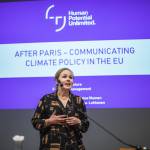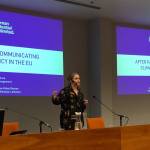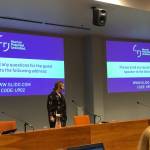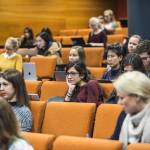 Climate change, one of the largest environmental threats today, is among the issues that can’t be solved on a small scale. It needs to be combated collectively, which requires international negotiations and agreements. Climate change is not only a political, but also an economic agenda, and it is not solely owned by the politicians. How to reach a consensus with such a heterogeneous group of various actors? The Master’s Degree Programme in Leadership for Change had the pleasure of hosting a guest lecture titled ‘After Paris – Communicating Climate Policy in the EU’ with Anna-Kaisa Itkonen, the European Commission Spokesperson for Climate Action and Energy.
Climate change, one of the largest environmental threats today, is among the issues that can’t be solved on a small scale. It needs to be combated collectively, which requires international negotiations and agreements. Climate change is not only a political, but also an economic agenda, and it is not solely owned by the politicians. How to reach a consensus with such a heterogeneous group of various actors? The Master’s Degree Programme in Leadership for Change had the pleasure of hosting a guest lecture titled ‘After Paris – Communicating Climate Policy in the EU’ with Anna-Kaisa Itkonen, the European Commission Spokesperson for Climate Action and Energy.
 Anna-Kaisa Itkonen stands as an ambassador for climate change action – not only in her professional life, but also personally. She is currently a member of the Steering Group, a group dedicated to developing climate-friendly practices in the agricultural sector; a columnist for Vihreä Lanka, a magazine and social media site that promotes green values; and a founding member of the Woman Enablers Change Agent Network (WECAN), a group dedicated to raising awareness of gender equality. Her involvement in these organizations shows a passion and commitment to making a positive difference, which the Leadership for Change students found to be inspirational.
Anna-Kaisa Itkonen stands as an ambassador for climate change action – not only in her professional life, but also personally. She is currently a member of the Steering Group, a group dedicated to developing climate-friendly practices in the agricultural sector; a columnist for Vihreä Lanka, a magazine and social media site that promotes green values; and a founding member of the Woman Enablers Change Agent Network (WECAN), a group dedicated to raising awareness of gender equality. Her involvement in these organizations shows a passion and commitment to making a positive difference, which the Leadership for Change students found to be inspirational.
Ms. Itkonen has a wealth of knowledge regarding climate change due to her multiple roles. In her speech, she focused specifically on the communication of climate change issues at the political level in the EU and the world, as well as the role of the Paris Conference on Climate Change 2015.
“Paris changed everything in Europe”
 In the beginning of her speech, Ms. Itkonen highlighted the great importance of the Paris Agreement, which became the first universal climate agreement and completely changed the way of discussing climate change in Europe. Through her speech, she mentioned that the results of the discussions at the Paris Conference significantly raised the status of the European Commission in terms of communication about climate change and made it a more influential figure in the context of international negotiations in this field.
In the beginning of her speech, Ms. Itkonen highlighted the great importance of the Paris Agreement, which became the first universal climate agreement and completely changed the way of discussing climate change in Europe. Through her speech, she mentioned that the results of the discussions at the Paris Conference significantly raised the status of the European Commission in terms of communication about climate change and made it a more influential figure in the context of international negotiations in this field.
Ms. Itkonen told the audience the story of how the preparation for the Paris Conference looked from the inside. Before the negotiations, the goal of the European Commission was to create a coalition for negotiations, and for this they embarked upon a trip around the world to establish personal contact with countries’ representatives. From the point of view of communication, it was important to create a story to attract attention. Twitter became an instrument: the methodological publication of Tweets from different parts of the world did its job – attention to what was happening was attracted. However, despite the formation of the high ambition coalition beforehand, difficulties arose during the COP 21. It was tough for dozens of politicians from different countries to find a unified compromise. In spite of everything, the hard work of negotiators was not in vain, and consensus was reached. The lecturer also tackled the topic of leadership in terms of communication about climate change. Ms. Itkonen stressed that when we talk about climate actions, it is not that crucial who is the climate leader, but it is significant for any country to do what was promised in Paris.
 An interesting point, which was highlighted in the lecture, is that the EU also has internal problems when it comes to communicating about climate change. Ms. Itkonen mentioned that despite the fact the European Union is united, there are still 28 member countries. These countries are diverse in terms of nature, climate, culture, and a whole host of other conditions, meaning that each country has a different perception of climate problems. This is a communicational shortcoming, which is why creating a climate policy even within these 28 countries is challenging. The hottest discussion topic is speed of change. International Plant Protection Convention (IPPC) in this term is a massive warning showing that the speed of action for dealing with climate issues is critical.
An interesting point, which was highlighted in the lecture, is that the EU also has internal problems when it comes to communicating about climate change. Ms. Itkonen mentioned that despite the fact the European Union is united, there are still 28 member countries. These countries are diverse in terms of nature, climate, culture, and a whole host of other conditions, meaning that each country has a different perception of climate problems. This is a communicational shortcoming, which is why creating a climate policy even within these 28 countries is challenging. The hottest discussion topic is speed of change. International Plant Protection Convention (IPPC) in this term is a massive warning showing that the speed of action for dealing with climate issues is critical.
Finally, Ms. Itkonen shared a very curious idea on communication about the problems. There are two very important issues: the story and the timing. For effective international communication, it is not just about deciding what you want to say – you need to create a story about it, the narrative is the key. At the same time, it is significant to speak out at the right time in order to be heard. According to the speaker’s point of view, Europe should learn from communication experience of American colleagues in this respect.
As Ms. Itkonen’s speech drew to a close, we were also fortunate to hear the comments from Senior Specialist at the Ministry of Environment Johanna Kentala-Lehtonen, who recently completed her dissertation titled ‘Climate Change as Problem of Direction and Pace of Transition: Large Finnish Business Actors’ Identity, Interests, and Political Response Strategies to Climate Politics’ at the Faculty of Management and Business, Tampere University.
 To begin, Ms. Kentala-Lehtonen reiterated a point from the speech that coincided with her own research, specifically, that of ‘time’ and ‘speed’ in communication. She noted that the pace and direction of the climate action transition are prominent issues that need addressing. From the EU’s perspective, they must consider how to influence actor’s interests and motivations, while as a society, we must accept that climate policy is a part of our lives.
To begin, Ms. Kentala-Lehtonen reiterated a point from the speech that coincided with her own research, specifically, that of ‘time’ and ‘speed’ in communication. She noted that the pace and direction of the climate action transition are prominent issues that need addressing. From the EU’s perspective, they must consider how to influence actor’s interests and motivations, while as a society, we must accept that climate policy is a part of our lives.
“Citizens, firms, and organizations need to be ready to accept the impact”
One important point that Ms. Kentala-Lehtonen mentioned was that although Europeans acknowledge climate change as a problem, few are willing to make any changes to their daily lives. At this point, Ms. Kentala-Lehtonen spoke to us as students of the Leadership for Change program, advocating that decision-makers need to be ready to listen and understand climate change. Businesses must look beyond profits, people must consider more than their own interests, and climate policy is not just about the most ambitious target; rather, it should be a vision of what society will look like and how we can make it a better place.
 In response to the comments, Ms. Itkonen added a populist perspective, highlighting a disparity between political, business, and public interests. Many politicians claim they need to address problems within their own countries before they can deal with those that are out of their jurisdiction. Despite this claim, in 2018 the EU conducted a poll asking the ‘people’ what they considered the most important issues for the EU; interestingly, the results from the poll showed that the top three answers to this question were migration, climate change, and terrorism, all three of which are international problems. These are issues that cannot be dealt with on a small scale, nor independently, nor can be fixed by implementing one policy; these questions need to be approached broadly, transparently, and most important, collectively.
In response to the comments, Ms. Itkonen added a populist perspective, highlighting a disparity between political, business, and public interests. Many politicians claim they need to address problems within their own countries before they can deal with those that are out of their jurisdiction. Despite this claim, in 2018 the EU conducted a poll asking the ‘people’ what they considered the most important issues for the EU; interestingly, the results from the poll showed that the top three answers to this question were migration, climate change, and terrorism, all three of which are international problems. These are issues that cannot be dealt with on a small scale, nor independently, nor can be fixed by implementing one policy; these questions need to be approached broadly, transparently, and most important, collectively.
As students of the MDP in Leadership for Change, we were inspired to hear that change is happening; not always quickly and not always without conflicts, but nevertheless, efforts are being made and promises are being realised. It is our ambition and pledge that as future leaders, these words will stay with us and influence our actions in the support of climate change and making a more sustainable future.

The lecture was organised by first-year LFC students Anastasia Pavlova, Charlotte Walker, Aaron Donnelly, Emma Saramäki, Ilia Safrutin, Leyla Yacine and Roosa Purmonen.
Photos by Julia Bethwaite and Jonne Renvall.


Comments